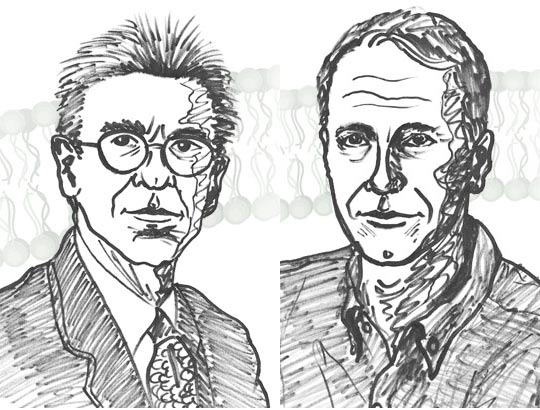2012 Nobel Prize in Chemistry Awards Groundbreaking Cell Research

Two U.S. scientists have won the Nobel Prize in chemistry for discovering a primary way the billions of cells in the body sense their environment, the Royal Swedish Academy of Sciences announced today (Oct. 10).
In groundbreaking research, Robert Lefkowitz and Brian Kobilka figured out the inner workings of so-called G-protein–coupled receptors (GPCRs). These receptors, or tiny sensors on cells, interact with the fight-or-flight hormone adrenalin (also called epinephrine), dopamine, serotonin, light, flavor and odor.
In fact, in times of stress, a type of GPCR mediates the many effects of adrenaline, including dilation of pupils, constriction of blood vessels and heart-rate increase.
"The work of Robert Lefkowitz and Brian Kobilka has helped us to understand more fully how our cells react to external influences such as the hormone adrenalin," Martyn Poliakoff, foreign secretary and vice president of the Royal Society, said in a statement.
"Understanding how our bodies prepare for fight or flight is just one of the applications of their work, which has also opened the door for a wide range of new, more effective drug treatments with fewer side effects," Poliakoff added.
These receptors mediate the effects of about half of all medicines, including beta-blockers, antihistamines and several psychiatric medications. GCPRs are also quite complex, and so trying to image one of them seemed an elusive goal.
In 2011, Kobilka his research team did just that, capturing an image of one GCPR called β-adrenergic receptor (it binds with the hormone adrenaline) just as it was activated by the hormone and sending a signal into the cell. "This image is a molecular masterpiece – the result of decades of research," according to a statement on the Nobel Prize website. [In Photos: Nobel Prize Winners 2012]
Sign up for the Live Science daily newsletter now
Get the world’s most fascinating discoveries delivered straight to your inbox.
When the Royal Society called to let Kobilka know of his award — it was the middle of the night for him in California — he missed it. Luckily, they called again, but even then Kobilka thought it was a prank. "I thought it was some friends initially. But I don't have friends with a really good Swedish accent so then I started believing it," he said during an interview with the Nobel Prize website.
Kobilka, of Stanford University School of Medicine, and Lefkowitz, of Howard Hughes Medical Institute, Duke University Medical Center, will receive their Nobel Prizes on Dec. 10.
The Nobel Prizes in physiology or medicine and in physics were announced Monday (Oct. 8) and Tuesday (Oct. 9), respectively; the Nobels in Literature and in Peace will be announced Thursday and Friday, respectively, with the Sveriges Riksbank Prize in Economic Sciences to be announced Monday, Oct. 15.
Follow LiveScience on Twitter @livescience. We're also on Facebook & Google+.
Jeanna Bryner is managing editor of Scientific American. Previously she was editor in chief of Live Science and, prior to that, an editor at Scholastic's Science World magazine. Bryner has an English degree from Salisbury University, a master's degree in biogeochemistry and environmental sciences from the University of Maryland and a graduate science journalism degree from New York University. She has worked as a biologist in Florida, where she monitored wetlands and did field surveys for endangered species, including the gorgeous Florida Scrub Jay. She also received an ocean sciences journalism fellowship from the Woods Hole Oceanographic Institution. She is a firm believer that science is for everyone and that just about everything can be viewed through the lens of science.










